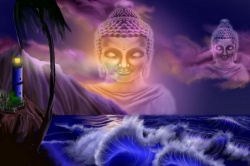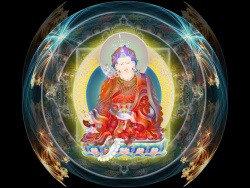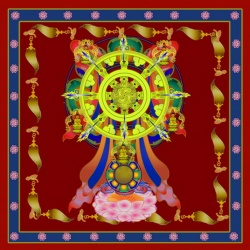Difference between revisions of "The Gangottara Sutra"
(Created page with "<poem> The Sutra Called "Flawless Purity" A dialogue with the Laywoman Gangottara Thus have I heard. Once the Buddha was dwelling in the garden of Anat...") |
|||
| Line 1: | Line 1: | ||
| + | |||
| + | {{GenerateImages|5}} | ||
<poem> | <poem> | ||
| − | The [[Sutra]] Called " | + | The [[Sutra]] Called "[[Flawless Purity]]" |
| − | A dialogue with the Laywoman Gangottara | + | A dialogue with the Laywoman [[Gangottara]] |
| Line 8: | Line 10: | ||
[[Thus have I heard]]. | [[Thus have I heard]]. | ||
| − | Once the [[Buddha]] was dwelling in the garden of [[Anathapindika]], in the [[Jeta Grove]] near [[Shravasti]]. At that [[time]], a laywoman named Gangottara came from her dwelling in [[Shravasti]] to see the [[Buddha]]. She prostrated herself with her head at the [[Buddha's]] feet, withdrew to one side, and sat down. | + | Once the [[Buddha]] was dwelling in the garden of [[Anathapindika]], in the [[Jeta Grove]] near [[Shravasti]]. At that [[time]], a laywoman named [[Gangottara]] came from her dwelling in [[Shravasti]] to see the [[Buddha]]. She prostrated herself with her head at the [[Buddha's]] feet, withdrew to one side, and sat down. |
| − | The [[world honored one]] asked Gangottara, "Where do you come from?" | + | The [[world honored one]] asked [[Gangottara]], "Where do you come from?" |
The Laywoman asked the [[Buddha]], "[[World-Honored One]], if someone were to ask a magically produced being where he came from, how should the question be answered? | The Laywoman asked the [[Buddha]], "[[World-Honored One]], if someone were to ask a magically produced being where he came from, how should the question be answered? | ||
| Line 18: | Line 20: | ||
The [[Buddha]] said, "Yes indeed, what you say is true" | The [[Buddha]] said, "Yes indeed, what you say is true" | ||
| − | Gangottara asked, "If all things are [[illusory]], like [[magic]], why did you ask me where I came from?" | + | [[Gangottara]] asked, "If all things are [[illusory]], like [[magic]], why did you ask me where I came from?" |
| − | The [[World Honored One]] told her, "A magically produced being does not go to the [[miserable]] planes of [[existence]], nor to [[heaven]]; nor does he attain [[nirvana]]. Gangottara is that also true of you?" | + | The [[World Honored One]] told her, "A magically produced being does not go to the [[miserable]] planes of [[existence]], nor to [[heaven]]; nor does he attain [[nirvana]]. [[Gangottara]] is that also true of you?" |
The Laywoman replied, "As I see it, if my own [[body]] were different from a magically produced one, then I could speak of going to the good and [[miserable]] planes of [[existence]], or of [[attaining]] [[Nirvana]]. I see no difference, though, between my [[body]] and a magically produced one, so how can I speak of going to the good or [[miserable]] planes, or of [[attaining]] [[nirvana]]? | The Laywoman replied, "As I see it, if my own [[body]] were different from a magically produced one, then I could speak of going to the good and [[miserable]] planes of [[existence]], or of [[attaining]] [[Nirvana]]. I see no difference, though, between my [[body]] and a magically produced one, so how can I speak of going to the good or [[miserable]] planes, or of [[attaining]] [[nirvana]]? | ||
| Line 28: | Line 30: | ||
The [[Buddha]] asked, "Do you not seek the state of [[nirvana]]?" | The [[Buddha]] asked, "Do you not seek the state of [[nirvana]]?" | ||
| − | Gangottara asked in turn, "If this question were put to one who had never come into being, how should it be answered?" | + | [[Gangottara]] asked in turn, "If this question were put to one who had never come into being, how should it be answered?" |
The [[Buddha]] replied, "That which has never come into being is [[nirvana]] itself." | The [[Buddha]] replied, "That which has never come into being is [[nirvana]] itself." | ||
| − | Gangottara asked, "Are not all things [[identical]] with [[nirvana]]?" | + | [[Gangottara]] asked, "Are not all things [[identical]] with [[nirvana]]?" |
The [[Buddha]] replied, "So they are, so they are." | The [[Buddha]] replied, "So they are, so they are." | ||
| Line 38: | Line 40: | ||
The [[World-Honored One]] told her, "A magically produced being has no [[mental]] [[attachments]] (and thus seeks [[nothing]])." | The [[World-Honored One]] told her, "A magically produced being has no [[mental]] [[attachments]] (and thus seeks [[nothing]])." | ||
| − | Gangottara inquired, "Does the [[Tathagata's]] very question stem from some [[mental]] [[attachment]]?" | + | [[Gangottara]] inquired, "Does the [[Tathagata's]] very question stem from some [[mental]] [[attachment]]?" |
The [[World-Honored One]] told her, "I raised the question because there are in this assembly good men and good women who can be brought to maturity. I am free of [[mental]] [[attachments]]. Why? Because the [[Tathagata]] [[knows]] that even the names of things are inaprehensible, let alone the things themselves or those who seek [[nirvana]]." | The [[World-Honored One]] told her, "I raised the question because there are in this assembly good men and good women who can be brought to maturity. I am free of [[mental]] [[attachments]]. Why? Because the [[Tathagata]] [[knows]] that even the names of things are inaprehensible, let alone the things themselves or those who seek [[nirvana]]." | ||
| − | Gangottara said, "If so, why all the [[accumulation]] of [[good roots]] for the [[attainment]] of [[enlightenment]]?" | + | [[Gangottara]] said, "If so, why all the [[accumulation]] of [[good roots]] for the [[attainment]] of [[enlightenment]]?" |
[The [[Buddha]] replied,] "Neither [[Bodhisattvas]] nor their [[good roots]] can be apprehended, because in the [[Bodhisattvas]]' [[minds]] there is no discriminative [[thought]] as to whether they are accumulating [[good roots]] or not." | [The [[Buddha]] replied,] "Neither [[Bodhisattvas]] nor their [[good roots]] can be apprehended, because in the [[Bodhisattvas]]' [[minds]] there is no discriminative [[thought]] as to whether they are accumulating [[good roots]] or not." | ||
| − | Gangottara asked, "What do you mean by 'no discriminative [[thought]]'?" | + | [[Gangottara]] asked, "What do you mean by 'no discriminative [[thought]]'?" |
The [[World-Honored One]] answered, "The absence of discriminative [[thought]] canot be understood or grasped by means of [[thinking]]. Why? Because in the state [of no discriminative [[thought]]], even the [[mind]] is inapprehensible, let alone the {{Wiki|mental functions}}. This state , in which the [[mind]] is inaprehensible, is called [[inconceivable]]. It cannot be grasped or [[realized]]; it is neither [[pure]] nor impure. Why so? Because, as the [[Tathagata]] always [[teaching]], all thins are as [[empty]] and unimpeded as [[space]]." | The [[World-Honored One]] answered, "The absence of discriminative [[thought]] canot be understood or grasped by means of [[thinking]]. Why? Because in the state [of no discriminative [[thought]]], even the [[mind]] is inapprehensible, let alone the {{Wiki|mental functions}}. This state , in which the [[mind]] is inaprehensible, is called [[inconceivable]]. It cannot be grasped or [[realized]]; it is neither [[pure]] nor impure. Why so? Because, as the [[Tathagata]] always [[teaching]], all thins are as [[empty]] and unimpeded as [[space]]." | ||
| − | Gangottara inquired, "If all things are [[empty]] [[space]], why does the [[World-Honored One]] speak of [[form]], [[feeling]], {{Wiki|conception}}, impulse and [[consciousness]]; the [eighteen] [[elements]]; the [twelve[ entrances; the [[twelve links of dependent origination]]; the {{Wiki|defiled}} and the undefiled; the [[pure]] and the impure; [[samsara and nirvana]]?" | + | [[Gangottara]] inquired, "If all things are [[empty]] [[space]], why does the [[World-Honored One]] speak of [[form]], [[feeling]], {{Wiki|conception}}, impulse and [[consciousness]]; the [eighteen] [[elements]]; the [twelve[ entrances; the [[twelve links of dependent origination]]; the {{Wiki|defiled}} and the undefiled; the [[pure]] and the impure; [[samsara and nirvana]]?" |
| − | The [[Buddha]] told Gangottara, "When I speak of a '[[self]]', for example, althugh I express the {{Wiki|concept}} by a [[word]], actually, the [[nature]] of '[[self]]' is inapprehensible. I speak of [[form]], but in [[reality]] the [[nature]] of [[form]] is also inapprehensible, and so it is with the other [[[dharmas]]], up to [[nirvana]]. Just as we cannot find [[water]] in mirages, so we cannot find a [[nature]] in [[form]], and so it is with the others, up to [[nirvana]]. | + | The [[Buddha]] told [[Gangottara]], "When I speak of a '[[self]]', for example, althugh I express the {{Wiki|concept}} by a [[word]], actually, the [[nature]] of '[[self]]' is inapprehensible. I speak of [[form]], but in [[reality]] the [[nature]] of [[form]] is also inapprehensible, and so it is with the other [[[dharmas]]], up to [[nirvana]]. Just as we cannot find [[water]] in mirages, so we cannot find a [[nature]] in [[form]], and so it is with the others, up to [[nirvana]]. |
| − | "Gangottara, only a [[person]] who cultivates [[pure conduct]] in accordance with the [[Dharma]], perceiving that [[nothing]] can be apprehended, deserves to be called a {{Wiki|real}} cultivator of [[pure conduct]]. Since the [[arrogant]] say that they have apprehended something, they cannot be said to be firmly established in genuine [[pure conduct]]. Such [[arrogant]] [[people]] will be terrified and [[doubtful]] when they hear this profound [[Dharma]]. They will be unable to liberate themselves from [[birth]], [[old age]], [[sickness]], [[death]], {{Wiki|worry}}, [[sorrow]], [[suffering]] and {{Wiki|distress}}. | + | "[[Gangottara]], only a [[person]] who cultivates [[pure conduct]] in accordance with the [[Dharma]], perceiving that [[nothing]] can be apprehended, deserves to be called a {{Wiki|real}} cultivator of [[pure conduct]]. Since the [[arrogant]] say that they have apprehended something, they cannot be said to be firmly established in genuine [[pure conduct]]. Such [[arrogant]] [[people]] will be terrified and [[doubtful]] when they hear this profound [[Dharma]]. They will be unable to liberate themselves from [[birth]], [[old age]], [[sickness]], [[death]], {{Wiki|worry}}, [[sorrow]], [[suffering]] and {{Wiki|distress}}. |
| − | "Gangottara, after my [[parinirvana]], there will be some [[people]] able to spread this profound [[Dharma]], which can stop the rounds of [[samsara]]. However, some fools, because of their [[evil]] [[views]], will [[hate]] those Dharma-masters, and will contrive to harm them. Such fools will fall to the [[hells]] for that." | + | "[[Gangottara]], after my [[parinirvana]], there will be some [[people]] able to spread this profound [[Dharma]], which can stop the rounds of [[samsara]]. However, some fools, because of their [[evil]] [[views]], will [[hate]] those Dharma-masters, and will contrive to harm them. Such fools will fall to the [[hells]] for that." |
| − | Gangottara asked, "You speak of 'this profound [[Dharma]] which can stop the rounds of [[samsara]].' What do you mean by 'stop the rounds of [[samsara]]'?" | + | [[Gangottara]] asked, "You speak of 'this profound [[Dharma]] which can stop the rounds of [[samsara]].' What do you mean by 'stop the rounds of [[samsara]]'?" |
The [[World-Honored One]] replied, "To stop the rounds of [[samsara]] is to [penetrate] [[reality]], the [[realm]] of the [[inconceivable]]. Such a [[Dharma]] cannot be damaged or destroyed. Hence, it is called he [[Dharma]] that can stop the rounds of [[samsara]]." | The [[World-Honored One]] replied, "To stop the rounds of [[samsara]] is to [penetrate] [[reality]], the [[realm]] of the [[inconceivable]]. Such a [[Dharma]] cannot be damaged or destroyed. Hence, it is called he [[Dharma]] that can stop the rounds of [[samsara]]." | ||
| Line 65: | Line 67: | ||
[[Seeing]] this, the Ven. [[Ananda]] [[thought]] to himself, "The [[Tathagata]], the [[Worthy]] One, the Supremely [[Enlightened One]], does not [[smile]] without a [[reason]]." He rose from his seat, uncovered his right shoulder, knelt on his right knee, and joined his palms toward the [[Buddha]], inquiring, "Why did the [[Budha]] [[smile]]?" | [[Seeing]] this, the Ven. [[Ananda]] [[thought]] to himself, "The [[Tathagata]], the [[Worthy]] One, the Supremely [[Enlightened One]], does not [[smile]] without a [[reason]]." He rose from his seat, uncovered his right shoulder, knelt on his right knee, and joined his palms toward the [[Buddha]], inquiring, "Why did the [[Budha]] [[smile]]?" | ||
| − | The [[Buddha]] replied, "I call that, in the past, a thousand [[Tathagatas]] also taught this [[Dharma]] here, and each of those [[assemblies]] was also led by a laywoman named Gangottara. After hearing this [[Dharma]] {{Wiki|preached}}, the laywoman and all the assembly left the [[household life]]. [In [[time]],] they entered the [[nirvana]] without residue." | + | The [[Buddha]] replied, "I call that, in the past, a thousand [[Tathagatas]] also taught this [[Dharma]] here, and each of those [[assemblies]] was also led by a laywoman named [[Gangottara]]. After hearing this [[Dharma]] {{Wiki|preached}}, the laywoman and all the assembly left the [[household life]]. [In [[time]],] they entered the [[nirvana]] without residue." |
[[Ananda]] asked the [[Buddha]], "What [[name]] should be given to this [[sutra]] and how should we accept and uphold it?" | [[Ananda]] asked the [[Buddha]], "What [[name]] should be given to this [[sutra]] and how should we accept and uphold it?" | ||
| Line 75: | Line 77: | ||
At that [[time]], the [[gods]] of the Desire-Realm magically produced various kinds of wonderful [[celestial]] [[flowers]] and scattered them upon the [[Buddha]], saying "Rare indeed is this laywoman, who can converse fearlessly with the [[Tathagata]] on {{Wiki|equal}} terms. She must have served and made [[offerings]] to countless [[Buddhas]], and planted [[good roots]] of every kind in their presence. | At that [[time]], the [[gods]] of the Desire-Realm magically produced various kinds of wonderful [[celestial]] [[flowers]] and scattered them upon the [[Buddha]], saying "Rare indeed is this laywoman, who can converse fearlessly with the [[Tathagata]] on {{Wiki|equal}} terms. She must have served and made [[offerings]] to countless [[Buddhas]], and planted [[good roots]] of every kind in their presence. | ||
| − | After the [[Buddha]] had finished {{Wiki|speaking}} this [[sutra]], the laywoman Gangottara and all the [[gods]], [[humans]], [[asuras]], [[gandharvas]], and so forth were jubilant over the [[Buddha's teaching]]. They accepted it with [[faith]] and began to follow it with veneration. | + | After the [[Buddha]] had finished {{Wiki|speaking}} this [[sutra]], the laywoman [[Gangottara]] and all the [[gods]], [[humans]], [[asuras]], [[gandharvas]], and so forth were jubilant over the [[Buddha's teaching]]. They accepted it with [[faith]] and began to follow it with veneration. |
</poem> | </poem> | ||
{{R}} | {{R}} | ||
[http://www.tuvienquangduc.com.au/English/Maha/20sutra.html www.tuvienquangduc.com.au] | [http://www.tuvienquangduc.com.au/English/Maha/20sutra.html www.tuvienquangduc.com.au] | ||
[[Category:Gangottara Sutra]] | [[Category:Gangottara Sutra]] | ||
Revision as of 04:11, 12 November 2013
The Sutra Called "Flawless Purity"
A dialogue with the Laywoman Gangottara
Thus have I heard.
Once the Buddha was dwelling in the garden of Anathapindika, in the Jeta Grove near Shravasti. At that time, a laywoman named Gangottara came from her dwelling in Shravasti to see the Buddha. She prostrated herself with her head at the Buddha's feet, withdrew to one side, and sat down.
The world honored one asked Gangottara, "Where do you come from?"
The Laywoman asked the Buddha, "World-Honored One, if someone were to ask a magically produced being where he came from, how should the question be answered?
The World Honored One told her, "A magically produced being neither comes nor goes, is neither born nor perishes; how can one speak of a place from which he comes?
Then the laywoman asked, "Is it not true that all things are illusory, like magic?"
The Buddha said, "Yes indeed, what you say is true"
Gangottara asked, "If all things are illusory, like magic, why did you ask me where I came from?"
The World Honored One told her, "A magically produced being does not go to the miserable planes of existence, nor to heaven; nor does he attain nirvana. Gangottara is that also true of you?"
The Laywoman replied, "As I see it, if my own body were different from a magically produced one, then I could speak of going to the good and miserable planes of existence, or of attaining Nirvana. I see no difference, though, between my body and a magically produced one, so how can I speak of going to the good or miserable planes, or of attaining nirvana?
"Furthermore, World Honored One, nirvana's very nature is such that it is not reborn in the good or miserable planes, nor does it experience parinirvana. I perceive that the same is true of my own nature."
The Buddha asked, "Do you not seek the state of nirvana?"
Gangottara asked in turn, "If this question were put to one who had never come into being, how should it be answered?"
The Buddha replied, "That which has never come into being is nirvana itself."
Gangottara asked, "Are not all things identical with nirvana?"
The Buddha replied, "So they are, so they are."
"World-Honored One, if all things are identical with nirvana, why did you ask me, 'Do you not seek the state of nirvana?' "Furthermore, World-Honored One, if a magically produced being asked another magically produced being, 'Do you not seek the state of nirvana?' what would the answer be?"
The World-Honored One told her, "A magically produced being has no mental attachments (and thus seeks nothing)."
Gangottara inquired, "Does the Tathagata's very question stem from some mental attachment?"
The World-Honored One told her, "I raised the question because there are in this assembly good men and good women who can be brought to maturity. I am free of mental attachments. Why? Because the Tathagata knows that even the names of things are inaprehensible, let alone the things themselves or those who seek nirvana."
Gangottara said, "If so, why all the accumulation of good roots for the attainment of enlightenment?"
[The Buddha replied,] "Neither Bodhisattvas nor their good roots can be apprehended, because in the Bodhisattvas' minds there is no discriminative thought as to whether they are accumulating good roots or not."
Gangottara asked, "What do you mean by 'no discriminative thought'?"
The World-Honored One answered, "The absence of discriminative thought canot be understood or grasped by means of thinking. Why? Because in the state [of no discriminative thought], even the mind is inapprehensible, let alone the mental functions. This state , in which the mind is inaprehensible, is called inconceivable. It cannot be grasped or realized; it is neither pure nor impure. Why so? Because, as the Tathagata always teaching, all thins are as empty and unimpeded as space."
Gangottara inquired, "If all things are empty space, why does the World-Honored One speak of form, feeling, conception, impulse and consciousness; the [eighteen] elements; the [twelve[ entrances; the twelve links of dependent origination; the defiled and the undefiled; the pure and the impure; samsara and nirvana?"
The Buddha told Gangottara, "When I speak of a 'self', for example, althugh I express the concept by a word, actually, the nature of 'self' is inapprehensible. I speak of form, but in reality the nature of form is also inapprehensible, and so it is with the other [[[dharmas]]], up to nirvana. Just as we cannot find water in mirages, so we cannot find a nature in form, and so it is with the others, up to nirvana.
"Gangottara, only a person who cultivates pure conduct in accordance with the Dharma, perceiving that nothing can be apprehended, deserves to be called a real cultivator of pure conduct. Since the arrogant say that they have apprehended something, they cannot be said to be firmly established in genuine pure conduct. Such arrogant people will be terrified and doubtful when they hear this profound Dharma. They will be unable to liberate themselves from birth, old age, sickness, death, worry, sorrow, suffering and distress.
"Gangottara, after my parinirvana, there will be some people able to spread this profound Dharma, which can stop the rounds of samsara. However, some fools, because of their evil views, will hate those Dharma-masters, and will contrive to harm them. Such fools will fall to the hells for that."
Gangottara asked, "You speak of 'this profound Dharma which can stop the rounds of samsara.' What do you mean by 'stop the rounds of samsara'?"
The World-Honored One replied, "To stop the rounds of samsara is to [penetrate] reality, the realm of the inconceivable. Such a Dharma cannot be damaged or destroyed. Hence, it is called he Dharma that can stop the rounds of samsara."
Then the World-Honored One smiled graciously and emitted from his forehead blue, yellow, red, white, and crystalline lights. The lights illuminated all the numerous lands, reaching as high as the Brahma Heaven, then returned and entered the top of the Buddha's head.
Seeing this, the Ven. Ananda thought to himself, "The Tathagata, the Worthy One, the Supremely Enlightened One, does not smile without a reason." He rose from his seat, uncovered his right shoulder, knelt on his right knee, and joined his palms toward the Buddha, inquiring, "Why did the Budha smile?"
The Buddha replied, "I call that, in the past, a thousand Tathagatas also taught this Dharma here, and each of those assemblies was also led by a laywoman named Gangottara. After hearing this Dharma preached, the laywoman and all the assembly left the household life. [In time,] they entered the nirvana without residue."
Ananda asked the Buddha, "What name should be given to this sutra and how should we accept and uphold it?"
The Buddha said, "This sutra is called 'Flawless Purity', and you should accept and uphold it by that name."
During the preaching of this sutra, seven hundred monks and four hundred nuns were liberated from defilements forever and their minds were set free.
At that time, the gods of the Desire-Realm magically produced various kinds of wonderful celestial flowers and scattered them upon the Buddha, saying "Rare indeed is this laywoman, who can converse fearlessly with the Tathagata on equal terms. She must have served and made offerings to countless Buddhas, and planted good roots of every kind in their presence.
After the Buddha had finished speaking this sutra, the laywoman Gangottara and all the gods, humans, asuras, gandharvas, and so forth were jubilant over the Buddha's teaching. They accepted it with faith and began to follow it with veneration.




